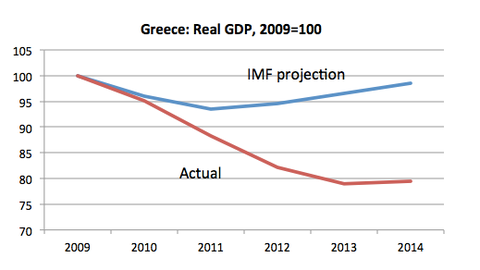Breaking Greece
NOBEL LAUREATES, EUROPE, 29 Jun 2015
Paul Krugman, Nobel Economics Laureate – The New York Times
25 Jun 2015 – I’ve been staying fairly quiet on Greece, not wanting to shout Grexit in a crowded theater. But given reports from the negotiations in Brussels, something must be said — namely, what do the creditors, and in particular the IMF, think they’re doing?
This ought to be a negotiation about targets for the primary surplus, and then about debt relief that heads off endless future crises. And the Greek government has agreed to what are actually fairly high surplus targets, especially given the fact that the budget would be in huge primary surplus if the economy weren’t so depressed. But the creditors keep rejecting Greek proposals on the grounds that they rely too much on taxes and not enough on spending cuts. So we’re still in the business of dictating domestic policy.
The supposed reason for the rejection of a tax-based response is that it will hurt growth. The obvious response is, are you kidding us? The people who utterly failed to see the damage austerity would do — see the chart, which compares the projections in the 2010 standby agreement with reality — are now lecturing others on growth? Furthermore, the growth concerns are all supply-side, in an economy surely operating at least 20 percent below capacity.
Talk to IMF people and they will go on about the impossibility of dealing with Syriza, their annoyance at the grandstanding, and so on. But we’re not in high school here. And right now it’s the creditors, much more than the Greeks, who keep moving the goalposts. So what is happening? Is the goal to break Syriza? Is it to force Greece into a presumably disastrous default, to encourage the others?
At this point it’s time to stop talking about “Graccident”; if Grexit happens it will be because the creditors, or at least the IMF, wanted it to happen.
___________________________________
Paul Krugman received the 2008 Nobel Prize in Economics. He joined The New York Times in 1999 as a columnist on the Op-Ed Page and continues as professor of Economics and International Affairs at Princeton University. He has taught at Yale, MIT and Stanford. He is the author or editor of 20 books and more than 200 papers in professional journals and edited volumes.
DISCLAIMER: The statements, views and opinions expressed in pieces republished here are solely those of the authors and do not necessarily represent those of TMS. In accordance with title 17 U.S.C. section 107, this material is distributed without profit to those who have expressed a prior interest in receiving the included information for research and educational purposes. TMS has no affiliation whatsoever with the originator of this article nor is TMS endorsed or sponsored by the originator. “GO TO ORIGINAL” links are provided as a convenience to our readers and allow for verification of authenticity. However, as originating pages are often updated by their originating host sites, the versions posted may not match the versions our readers view when clicking the “GO TO ORIGINAL” links. This site contains copyrighted material the use of which has not always been specifically authorized by the copyright owner. We are making such material available in our efforts to advance understanding of environmental, political, human rights, economic, democracy, scientific, and social justice issues, etc. We believe this constitutes a ‘fair use’ of any such copyrighted material as provided for in section 107 of the US Copyright Law. In accordance with Title 17 U.S.C. Section 107, the material on this site is distributed without profit to those who have expressed a prior interest in receiving the included information for research and educational purposes. For more information go to: http://www.law.cornell.edu/uscode/17/107.shtml. If you wish to use copyrighted material from this site for purposes of your own that go beyond ‘fair use’, you must obtain permission from the copyright owner.
4 Responses to “Breaking Greece”
Read more
Click here to go to the current weekly digest or pick another article:
NOBEL LAUREATES:
- Just Say No!
- Fasting for Gaza's Children
- Support Nobel Peace Laureate Mairead Maguire's 40-Day Fast for Palestinian Children and World Peace
EUROPE:


This so reflects my understanding and I regret that the press and other media are failing to make the same point.
The Greeks seem to be giving as much or more than is reasonable and it if the IMF and EU finance ministers who seem to be wanting to bring the Greek Government down so that their economic view may pertain.
There is only one spending cut that will solve not only Greece’s economic troubles, but many other countries as well.
I would say to Syriza: “get rid of Greece’s Armed Forces. Without Armed Forces, Turkey will never be able to attack Greece. The fortune saved will allow you to pay back all of Greece’s debts.
The other alternative, is the immoral USA hope that Greece will give them the beautiful and popular isle of Crete, for a big American Military base and holiday destination for USA military personnel and their families.
Of course,if Greece accepted such mad demand, IMF will leave them in Peace overnight.
[…] https://www.transcend.org/tms/2015/06/breaking-greece/ […]
[…] https://www.transcend.org/tms/2015/06/breaking-greece/ […]